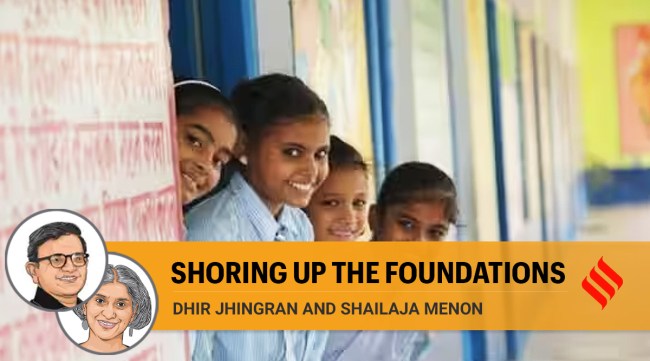Opinion Why duration of early literacy and numeracy programmes must be increased
Rather than cutting back on such programmes, it is important to broaden our vision of early foundational learning to include a focus on the relevance of literacy to children’s lives, strong oral expression, appreciation of literature, and capabilities to engage in written composition
 NIPUN Bharat, despite certain limitations, has begun to slowly improve the learnings of children in Grades 1-3 in several states. (Express File Photo/Representational)
NIPUN Bharat, despite certain limitations, has begun to slowly improve the learnings of children in Grades 1-3 in several states. (Express File Photo/Representational)
More than half the children in India are unable to read fluently with comprehension or do basic mathematical operations by the end of primary schooling. To address this, the National Education Policy (NEP 2020) suggested a national mission to ensure that all children attain foundational literacy and numeracy by the end of Grade 3.
Accordingly, the National Initiative for Proficiency in Reading with Understanding and Numeracy (NIPUN Bharat) programme was started by the Centre in 2021 to improve the foundational learning of five crore students in government primary schools. NIPUN Bharat, despite certain limitations, has begun to slowly improve the learnings of children in Grades 1-3 in several states.
However, in a recent decision, the Ministry of Education has rolled back the scope of NIPUN Bharat to children in Grades 1-2, leaving out children in Grade 3. The rationale provided for this shift is to bring about the alignment between NIPUN Bharat and the curricular structure suggested by the NEP 2020 and the National Curricular Framework (NCF 2023). These latter documents envisage a “foundational stage of learning” that would include three years of preschool education and the first two years of primary schooling. Hence, the argument is that the NIPUN Bharat programme should also end at Grade 2.
Anganwadi centres catering to three to six-year-olds focus largely on health, immunisation and nutrition, and only a small proportion of centres provide pre-school education with any regularity or quality. In this context, the setting up of a three to eight-year block in which children receive well-planned, high-quality educational services is still a distant goal.
The reality is that approximately 68 per cent of children in the three to six-year age group are not able to access educational services in India. Most children come from poorly literate home contexts and encounter literacy for the first time in Grade 1. Thirty-five per cent of children spend several years of primary schooling navigating complex gaps between home and school languages. Therefore, to roll back a programme that supports the learning of children in Grade 3 is to let go of a bird in hand (support for children currently in Grade 3), for two in the bush (the hope of a unified, functional schooling block for the three to eight-year-olds).
If anything, we should be providing extra support for children through Grades 1-5 so that they have enough time to establish robust foundations for language and numeracy learning. The NCF has merely argued for appropriate pedagogical practices to be followed for children in the three to eight-year age group, for example, a focus on play-based learning, flexible pace of learning, and the like.
The foundational stage described in the NEP and NCF does not intend to target the development of the whole range of literacy and numeracy skills, attitudes and knowledge required for all future learning in school by the end of Grade 2. In fact, most research conducted across the world and especially in Indian contexts show that these understandings develop slowly during the first four or five years of schooling.
Perhaps one of the reasons for such decisions is an inadequate understanding of what it means to establish strong foundations for early literacy and numeracy. It is possible that literacy, for example, is being understood as the ability to blend letters to read words at a certain pace by a certain age. Programmes like NIPUN Bharat have also contributed to the emergence of such an imagination. But rather than cutting back on such programmes, it becomes all the more important to broaden our vision of early foundational learning to include a focus on the relevance of literacy to children’s lives, strong oral expression, deep, inferential comprehension, enjoyment and appreciation of literature, and capabilities to engage in written composition.
Can foundations for these be expected to be established by the end of Grade 2 or even Grade 3? Rather, we should be arguing for lengthening the duration of programmes designed to strengthen early literacy and numeracy learning to include children in Grades 4 and 5 and to broaden their vision in terms of educational aims and outcomes. By cutting back on existing programmes we run the risk of falling further behind in our effort to improve foundational learning.
Jhingran is Founder & Executive Director, Language and Learning Foundation, Menon currently leads the Centre of Excellence in Early Literacy at Tata Trusts. Views are personal





